The following interview was taken by David Katz and published in the "Musical Root 2" magazine around 1991.
DAVID: How did you come to be in Jamaica?
AURA: I was in school, in the States, when I first became aware of Jamaica and eventually of
reggae music.
In '72, we saw Bob Marley with the Wailers in New York at Max's Kansas City, a small club.
Since then, of course, I was totally knocked out by reggae music and the lyrics, so I gradually
started listening, and wanting to know more about it.
In '76 they were having the big Carib fest in Jamaica and I decided to take advantage of that
occasion to go there. That's how I came to Jamaica the first time. In America, I was in Hunter
College, trying to get my first degree in the Arts. But because I had to take care of living
and all that, I was working at the same time and I got married to a jazz musician.
A year after I was in the States, I got involved in the music scene, more on the jazz and r-n-b
side of things. What I got to learn about reggae, it was in between. I worked with a group called
Aboriginal Music Society and I belonged to a theatre workshop which was called CART - Caribbean
American Repertoire Theatre. That was how I first found out about Carib fest actually, we were
all looking forward to seeing the cultural aspects of the Caribbean presented at this festival.
DAVID: How long did you stay at that time?

AURA: I enroled in school, because after Carib fest, I decided I wanted to stay for a while.
I enroled in the Jamaica school of Arts, in the Drama Department in Kingston, in order to stay.
At the same time, I was working quite a bit with United Africa with Cedric Brooks, 'Im' Brooks.
While I was at the Jamaica School of Arts, it was also a time when I got to move around and check
out the studios in King-ston.
There was Joe Gibbs, there was the one in Half Way Tree, there was Black Ark, Channel One ....
and at that time, there used to be a little restaurant, some ital restaurant that was in
New Kingston, not far from the Jamaica School of Arts, which the Manley government closed.
It was a place called Cafe D'Artique, or something like that. This was a cultural centre, where
in the front, they had all magazines selling and Jamaican crafts.
Kiddus-I had a little ital kitchen, and Jacob Miller had a little studio there. It was a place
wheremostly all the people in the arts, all the way from the bourgeois arts all the way down to
the roots musicians, everyone sort of met there. Kiddus-I's kitchen in the back was where the
roots thing used to be, and Cafe D'Artique was where the brass of the business met.
I met a lot of people there, especially at Kiddus-I's place, where I met Jah Youth, Dennis Brown,
Bunny, Gregory Isaacs, because everybody used to hang out to drink ital soup and exchange views.
It was during this period that I met Jimmy Cliff. I used to pass his house on my way to school
and I saw him one day working in his garden. When he found out I was from South Africa, he said
"You must come after your class this evening and have dinner with us so we can discuss things."
He had just been invited to South Africa, in fact, so he wanted to talk to me and find out what
I thought about it. And that meet-ingled to my working with him.
When I finished my course in '77, we took off for Francophone West Africa- Senegal and Mali,
Gambia and Sierra Leone, with the group from Jamaica. Sly was in that group, Chinna, Sticky,
and the keyboard player who used to work with Lee Perry at Black Ark ... I forget his name.
We finished the tour in Africa and Jimmy invited me to come back to Jamaica with him because
he was ready to do the album "Bongo Man". But on the way, we passed through London and this is
where I met Bob Marley and Lee Perry.
One day Jimmy took me to Island Records, it was during the time when Bob and Lee were doing
'Punky Reggae Party'. I went into the studio and Lee Perry says "Hey, you know man, I'm looking
for a singer. We're doing something downstairs and we've got Candy McKenzie and we need another
vocalist". Jimmy Cliff said "Here's Aura, she sings with me and we just came back from Africa".
That's how I met Lee Perry. It was at Island records' studios, with Bob Marley for 'Punky Reggae
Party' and 'Keep On Moving'. I think I met the Clash at the same time, because Lee was
co-producing their album or something. It was a very interesting and exciting period.
So we did the session. Since I was on my way to Jamaica, I was obliged to leave, even though I
had a lot of interesting offers to stay.
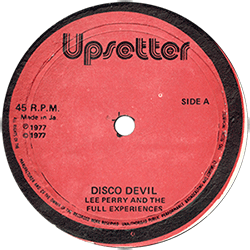
I went to Jamaica to wait on working with Jimmy on this album and Lee Perry came back from London
to Kingston. He had the Congoes "Heart of the Congoes" album, he had just been trying to make a
deal with Island records.
When Lee came back to Jamaica, I was working with another girl at the time, a black american girl
called Pamela Reed. Together we did a lot of backing vocals on a lot of Lee's productions like
'Disco Devil' and on 'Curley Locks'. We found ourselves working more and more for Scratch.
We were looking for somebody to produce an album, because I was trying to put together this project
which was Full Experience. It was my idea of three girls, three black women, one from Africa,
one from the Caribbean and one from black America, like Full Experience meaning the full black
experience. This was my dream.
Then I met Candy in London, she's from Guyana and she played keyboards and sang. When I heard that
she was coming I thought "this is a great opportunity to put this idea in motion". I had spoken to
Lee about it and you know Lee, all these pretty women, he thought yeah, why not?
One day, Pamela and I went to him and he heard some of the stuff we were working on, so he said
"Hey, let's do it!" I had put together eleven songs and we had chosen a couple of African songs
- one in Swahili-, really the first time that African songs had been done to reggae, if I do say so.
We did this album in a wonderful environment.
Lee Perry got the musicians together, but in the middle off all this work, as usual, little
aspects started coming in to create confusion. First there was Lee Perry's crush on Pamela.
Black Ark was in the same yard as his house and there was (his wife) Pauline and the kids and
everything. That was one side. Then, on the second side, Candy had a big crush on a certain
musician.
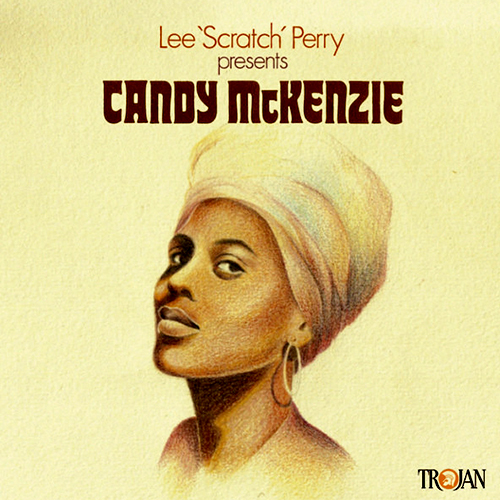
That was creating a lot of havoc on the musician's family side. So you can see a lot of
bad vibes started coming on the scene because of this. I was trying to keep everything straight
just until we finished the record. Candy didn't want to do her songs because Island was going to
back her to do an album of her own ... anyway, we finished the recording of the eleven songs.
By this time, I was afraid to leave the master tapes at Black Ark because I had learned a lot of
things. Since I had been working with Jimmy Cliff, I asked Jimmy if he would help me pay for the
masters and pay Lee like a producer. Then he and I would do an agreement for what we would do with
the music after that. I don't think Lee Perry appreciated that. With all the vibes that had started
to go on with the thing, with Pauline saying all the time it was going to be a flop, I felt like
maybe I would just take the master and do a deal with Jimmy.
AURA:
In the end, I got screwed by Jimmy! First of all, Jimmy was shocked when he heard what we had been
doing. He had been busy getting his productions out and he didn't even know we had been doing all
of this with Lee. When the time came and he went to listen to it ... from the moment I did that,
when Jimmy met Lee Perry, it was like I never existed. They made a deal between them. I don't know
what happened.
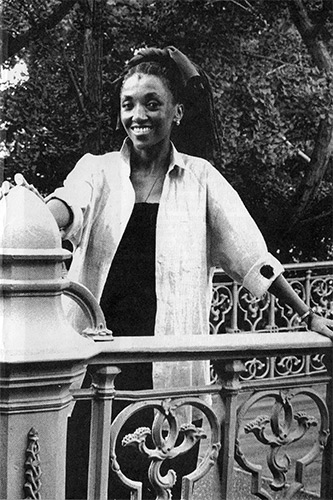
From the moment Jimmy got the masters, he would never let me hear what happened on the tape.
He took it to remix it, because it all had been done on four track and he felt like certain things
needed to be done. I don't know how he thought he was going to do things without consulting me,
but he had gone anyway and put the band on an eight track or a sixteen track. I think when Lee
gave the tape to Jimmy, he gave Jimmy a bad master on a bad tape.
Then Jimmy gave me five songs on the worst master quarter inch that Lee had given him. He said,
"Well, you know we can't do anything with this thing. I've taken it everywhere and they say they
can't do anything with it". Jimmy had given me a contract first and when I went to a lawyer,
the lawyer said it was no contract!
When I went back to Jamaica, Jimmy gave me the story of how it wasn't working, but if I wanted, he
would give me five of the songs. But I know that Jimmy had put the whole album on a good tape and
he was holding onto it. I almost went crazy, I almost flipped out. I felt so used and then the way
it was done. I couldn't even say anything to Lee. What could I say to Lee? All he would say was,
"yeah, you took it away from me and then you went and got fucked. You took it from a Rastaman, you
gave it to a Baldhead."
So this was the chaos that was taking place out of that wonderful thing which had started so
beautifully.
By the end, it had gotten into the regular old problem with Jamaican music, the reason why today
the music is where it's at. When I finished that thing, the voices were upfront and it was great,
with the rhythm track and Lee's mixing and all that.
Afterwards, when Lee and Jimmy started trying to work the thing by themselves, they want to add
horns on it, while it was still on the four track. By adding horns, the voices were taken too far
back. I guess Lee charged Jimmy all this money and then he gives Jimmy this thing where the voices
where too far back because he knew Jimmy would have a hard time dealing with it. Then the whole
thing went down the drain.
Anyway, I kept my little five songs and after a while I gave up. People were saying, "yeah, if we
had the masters, we could overdub, we could modernize the sound".
After three years of that, I decided to forget it. I put it to one side and I started doing other
things. Twelve years later, I found myself in France, sick of the United States, wanting to hear
nothing about Jamaicans and wanting a change - some fresh air. I came to France because I was
interested in what was happening with the African scene in France. I met Jose - he's done a lot
for reggae music here. He's the one who introduced me to Blue Moon. Jean Coton heard it and he
said "Man, this is the old sound of Scratch! Don't worry, we'll put it out".
DAVID: Tell me about the song "At Midnight".
AURA: Scratch is one of those prolific poets. I think he missed his calling. He is a great
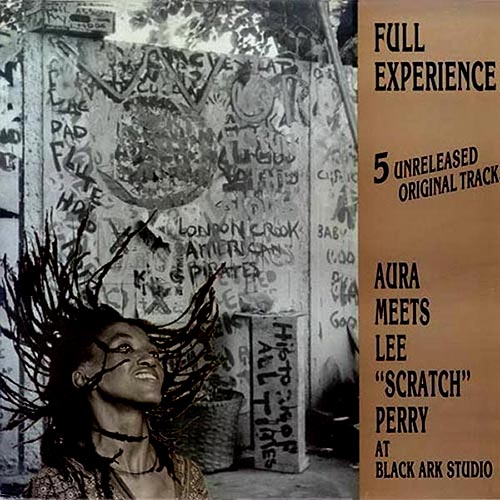
poet
in the sense of rhyme and he's so funny with the things that come out of his head. It was one of
those nights that we were really feeling good and we'd been working all day. It was at midnight
and it was a full moon, one of those wondrful Jamaican nights. We were saying "Wow, it's midnight!"
and I said something like "At midnight", and Lee Perry went "When the clock strikes". That's how
the song came about, right like that in the studio. The musicians just got into the rhythm.
'At Midnight' was one of those studio songs which gave me a lot of pleasure. I love the way
Scratch uses words and phrases. We used to do all the time off tape, but this time it worked
(on tape).
DAVID: Can you tell me anything about the six songs that were never issued?
AURA: There were a couple of love songs, a song that was inspired by someone that I really liked
a lot in Jamaica, which was an impossible situation. We did a beautiful arrangement for that one.
It was a mellow, more or less lover's rock, but with the Black Ark sound.
We did "Haposamane" which is a Swahili song of thanks to God for Nature, the mountains and the
animals. It's a Kenyan song, a beautiful song. Like I said, that was one of the African songs that
we did to reggae, we were one of the first to actually do that.
The second one was "Malaika", with the heavy Black Ark roots reggae sound.
There was a song that I wrote with Pamela Reed, one of the songs we co-wrote that we managed to
get on that record, before she decided she shouldn't put anything out and would keep it for her
own thing. It was called "Get Up Off of Your Seat" or "Let's Move". It was a really up tempo sort
of rock-reggae. It was really nice, with Pamela's black American sort of r-'n'-b influence in it.
Besides 'Full Experience', it would have been another strong single. Really, that was such a heavy
album.
Because of greed and because of trying to be slick, we all lost in the end. I'm sure that, if they
had let it happen, we would have all gottten something that we could have really did a great thing
with and took reggae on another level.
Eventually we were going to do mixed albums. Our idea was to use the different musics in the
different parts of the diaspora. But our first album, the choice of the rhythm was reggae.
DAVID: Are you still in contact with the other two singers?

AURA: No. I stayed in touch with Pamela Reed because she's from the States and we both went back
to the States. She had a child with a Jamaican who was working in New York, so she was living in
Brooklyn. Even now, I'm still in touch with her. She's back in the South, doing a lot of work.
She works at the colleges. Besides her classes, she gives reggae dance lessons and in her shows,
too, she has reggae pieces.
It has influenced all of our lives ... the problem is, my musix covers a wide sphere, a lot of
producers can't deal with me. I refuse to be intimidated by that, which is why I don't have much
music out. People keep telling me, "You are an African artist, you should do African Music".
To me, African music is all over the world now. Reggae music is part of African music, r-'n'-b is
part of African music, jazz is part of African music and my life experience is all those musics.
It's so frustating, because in order for me to work the way I'd like to work, I have to get a good
album out.
When I came to France, I came with a market wich is too old now, which is why I'm trying to get a
new one. Blue Moon is willing to do an album with me, but I'm not too confident with Blue Moon ...
there was no financial arrangement.
I did another single called "Azania". With that one, I don't know why, I never got any royalties.
I haven't gotten anything for that, I got something like 2000 francs for the studio session but
nothing else! So even though he's the only one right now, who will do an album with me, I would
rather not do it right now. I don't mind a 45, but I would shoot him if I have to lose another
album! I mean, after "Full Experience", I'm not ready for another trip like that.
Getting back to Lee Perry, after not seeing Lee since that period of '77, like early '78, I saw
Lee again at l'Elysée Montmartre.
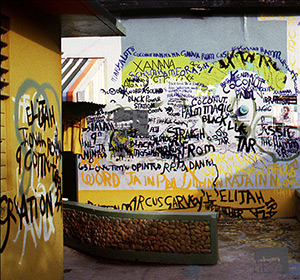
I had been to the Black Ark after Lee left, in 1980-81. There was no more studio, but there was
"Pipecock Jackxon", there was writing all over the wall! At first, I thought it was wallpaper,
I mean, the whole wall was written on. He's incredible, you know. You have to have a lot of
discipline to be able to do that. He is really one of the geniuses of our time, I must say.
I really have a lot of love and respect for him.
I heard he was going to be at l'Elysée Montmartre, so I went to see the show (the first of two
nights). It was a great night, I was totally knocked out by the show. He had a wonderfull rhythm
section. The thing that blew my mind was the two dancers he had with him. That was the first time
I saw a reggae group use the women not only to do the back up, but sexy dancers doing reggae in
front, I said to myself, even now, he's still an innovator.
With all the shit that has gone on, all these guys that have passed and all these ego trips,
Lee Perry, after his disappointment with the whole scene ... I can understand Lee, because he is a
Pisces. I can understand Lee's madness because I have that in me, but I'm too disciplined I guess,
or too repressed; I can't let it out like he does. But I understand it.
We got along well too, because the first time I saw him in London, he says to me "You look just
like my daughter" and it's true. When I got to Jamaica, his youngest daughter, we have the same
face! She looked like I did when I was at her age.
I know I'm going to meet Lee again, but I'm not setting it up. I'm not planning anything. I'd love
to run into him the same way we ran into each other the first time, at Island records.
DAVID: Tell me about the work you did with Malopoets.
AURA: I did some work on the "Life Is For Living" album, the female backing vocals on that.
DAVID: Your voice on that record sounds very different than the voice on your
other releases.
AURA: On 'Full Experience' I was using more of my lead vocal - it's another voice, a more natural
voice. Doing vocals in three parts, it's a more natural voice.
With Malopoets, I came in afterwards, when the whole thing was done and all the other back up
vocals were already there.
DAVID: Did you know Patrick Sefolotho from back home?
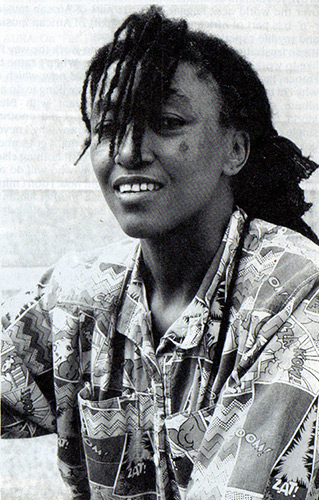
AURA: No. I met Malopoets when they first came out with "Malopoets" the album, I was living in
New York at the time. When they went on their tour of New York with EMI, the African guy who was
their road manager, didn't know anything about how to work with South Africans, so he called me.
He's a guy from Senegal, I forget his name. They were having a lot of problems with the
Anti-Apartheid Movement, all that kind of stuff. He didn't know anything about that kind of thing,
so I met Malopoets, Patrick and the other guys.
I loved their album. It was such a good, fresh sound. Here in the West, you don't really hear
really good stuff from South Africa. Malopoets blew my mind when I first heard that first thing,
so it was an honour to meet them. And I loved their vocal arrangements, I told them "well if you
guys ever need a woman, call me, I'll be glad to work with you", never thinking that three or four
years later they'd call me and say "We're doing an album, can you help us with the back ups?".
That's how I got onto that "Life Is For Living" album.
Mory Kante has just done a new album which will come out I think in September (1990), produced by
Nick Patrick, the one who did "YeKe YeKe", the last album. They called me up, at the last minute.
Mory has done a reprise, a remake of "The Lion Sleeps Tonight", with Malinke lyrics and with his
style of arrangements. It was a surprise, because when they called me, some of the guys from
Malopoets and the guy who was on Paul Simon's album had already done the male backing vocals,
the Zulu vocals, on that track. I guess they were trying to get Miriam Makeba, but the price was
too high, so at the last minute they called me up ... They put a lot of money into this one.
They got Quincy Jones' horn section on eight tracks and they went a little more into African
rhythms this time. They used the same gloss, like crossover music ...
DAVID: How did you end up working with Maxime LeForrestier?
AURA: When I first came here, I moved around to meet people. I went to radio Nova and I met a young
lady called Bintu Sissoko. I had given her my demo when I came to France in '86. This man was
looking for a song and he was looking for something different, something African in it. He had
looked in all the different parts of the world and then he thought "Why not South Africa"?". But
he didn't know any South Africans. he went to radio Nova and happened to talk to Bintu.
It happened that I was in the States at the time. So when I came back, everywhere I went, people
were saying "you've got to get in touch with Maxime LeForrestier. He's a big French star, we think
your ship has finally come in!".
I met the guy and he was a nice person. He said, "I've got this song, I'd love you to write
something in Zulu to sing in these parts of the song". We did that and it was very well received.
In '89 it was chosen as song of the year by the music industry in France. It was a big promotional
thing for me. We did an eighteen month tour of Belgium, France, Switzerland Canada ... Now I'm
thinking to use this opportunity to put something together.
But, at the same time, I have too many people telling me what I should do. Everybody's got their
own ideas, so I've just been taking it easy.
I was working with a South African jazz group, the Chris McGregor Brotherhood of Breath, which was
a wonderful group of musicians living in London. It's a big band, twenty of us on stage. Beautiful
music, contemporary and jazzy with South African rhythms. I sing one of the songs that was written
by Chris, but it gave me a chance also to do some of my own songs with a group behind that
understands my voice and my way of singing. It's been a very good experience for me, which was
sadly stopped in the middle of the tour when Chris fel sick in April and he died in may of cancer.
And Dudu Pukwana passed right after.
Chris came out with Dudu, six of them came out from South Africa at the same time, '62. They were
six, the Blue Notes, when they left South Africa. They came abroad and made music together and then
went their seperate directions, with Johnny Diani, Maholo, Mongese Fesa, Chris and Dudu Pukwana.
Everybody has died now except for Maholo.
This year started out wonderfully and then people have just been dying left and right. I needed to
just sort of stop for a while and wait and see what happens. So I've been concentrating more on
my home life. I've been recently married and my son just did his O-levels. This is what's happening
in my life right now.
|
|



